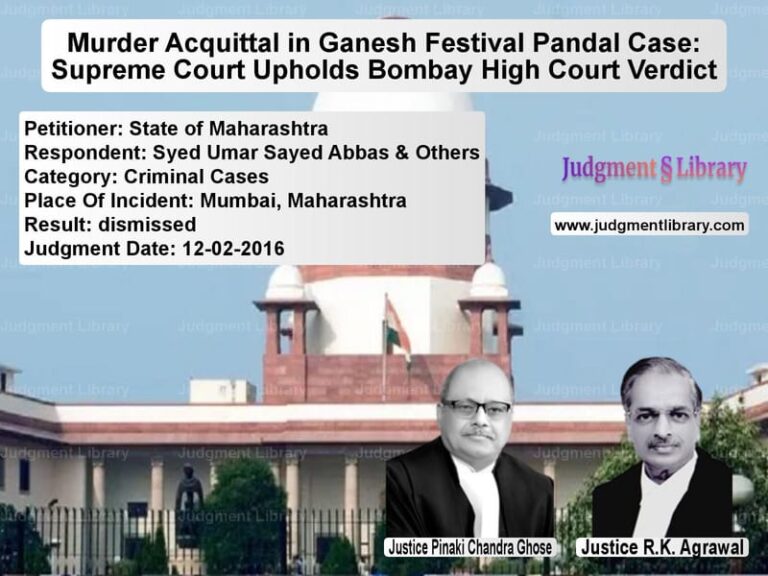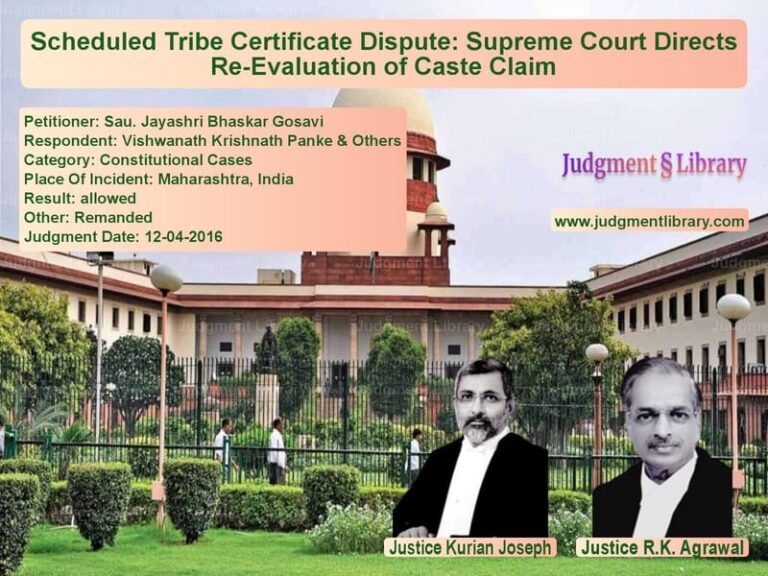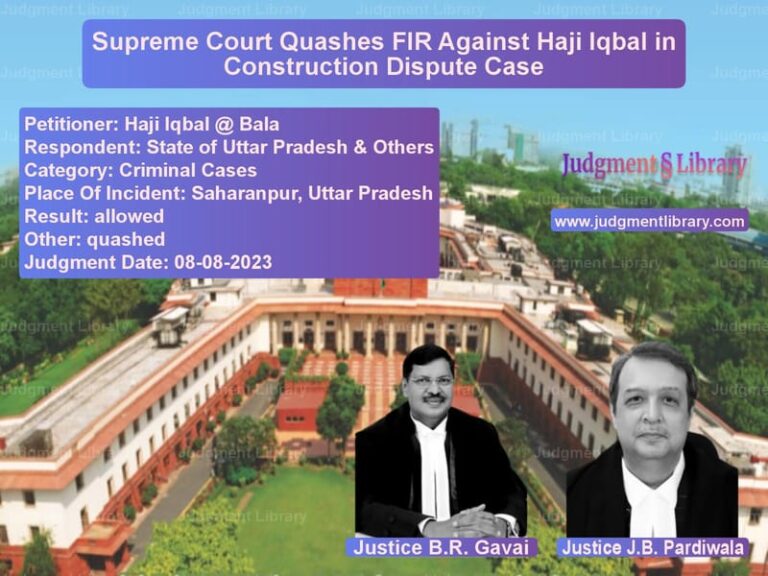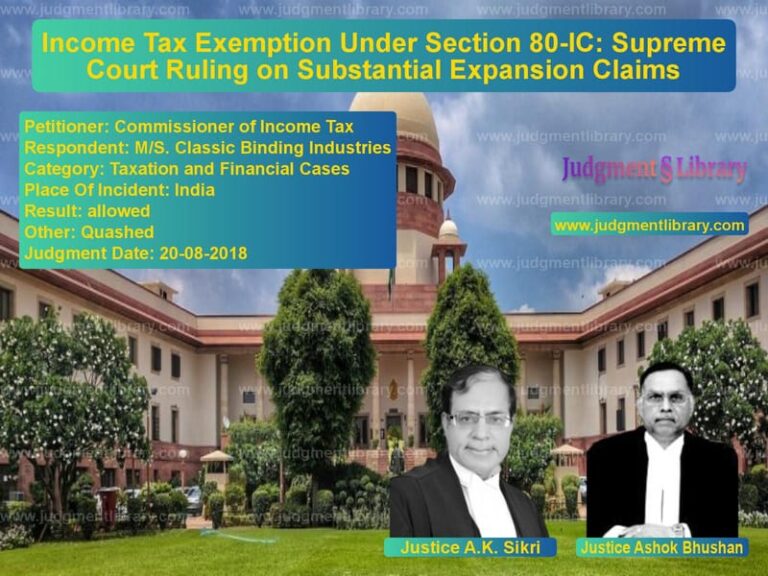Will Dispute and Legal Heirship: Supreme Court Rules on Property Succession
The Supreme Court of India recently ruled on a critical property dispute in Dhani Ram (Deceased) Through LRs & Others v. Shiv Singh, addressing the legal validity of a will and the rightful succession to ancestral property. The case revolved around the claim of inheritance based on an allegedly registered will and its challenge by a competing legal heir.
Background of the Case
The dispute centered on the inheritance of property originally owned by Sohan Lal, who had no children and was survived by his wife Leela Devi. Upon Leela Devi’s death on December 10, 1987, a will was produced by her brother’s son, Dhani Ram, claiming that she had bequeathed the properties to him. However, Shiv Singh, the son of Sohan Lal’s brother, challenged this will, asserting his claim as the rightful heir under intestate succession.
Shiv Singh filed a civil suit in 1990 to contest the will, arguing that the document was invalid and that he was entitled to inherit the property under Section 15 of the Hindu Succession Act, 1956. The trial court ruled in favor of Shiv Singh, rejecting the will’s validity. However, the appellate court reversed the decision, holding that the will was genuine. Shiv Singh then approached the Himachal Pradesh High Court, which reinstated the trial court’s decision, declaring the will invalid. Aggrieved by this outcome, Dhani Ram filed an appeal in the Supreme Court.
Legal Issues Raised
- Whether the will executed by Leela Devi was legally valid and free from suspicious circumstances.
- Whether Dhani Ram had properly proven the execution of the will under Section 63 of the Indian Succession Act, 1925.
- Whether Shiv Singh, as the brother’s son of Sohan Lal, was the rightful heir under the Hindu Succession Act.
Arguments by the Appellants (Dhani Ram’s Legal Representatives)
- The will was registered and executed before witnesses, proving its validity.
- Leela Devi had no children and had executed the will in favor of Dhani Ram because he and his family cared for her.
- The appellate court had correctly found the will to be free from suspicious circumstances.
Arguments by the Respondents (Shiv Singh)
- The will was surrounded by suspicious circumstances and was not proven to be executed properly.
- The two attesting witnesses gave contradictory testimonies, weakening the authenticity of the will.
- As per the Hindu Succession Act, Shiv Singh was entitled to inherit the property under intestate succession.
Supreme Court’s Observations
The Supreme Court scrutinized the will and its execution, focusing on compliance with Section 63 of the Indian Succession Act, 1925, which requires:
- The will to be signed by the testator.
- At least two attesting witnesses to have seen the testator sign the will.
- The attesting witnesses to sign in the testator’s presence.
The Court found that these essential legal requirements were not met due to the following reasons:
- The two attesting witnesses provided inconsistent statements, with one stating that Leela Devi signed in their presence while the other claimed he merely signed at Dhani Ram’s request.
- There was no independent verification that Leela Devi executed the will voluntarily.
- Dhani Ram was heavily involved in the will’s execution and registration, raising doubts about undue influence.
- The mere fact of registration of the will did not automatically prove its validity.
The Court cited previous rulings emphasizing that a registered will is not necessarily valid if there are suspicious circumstances. Referring to Rani Purnima Debi v. Kumar Khagendra Narayan Deb (1962 AIR SC 567), the Court held:
“The mere fact that a will is registered does not dispel suspicion regarding its execution. Courts must closely examine the surrounding circumstances to determine its authenticity.”
The Supreme Court reaffirmed that Shiv Singh, as the legal heir of Sohan Lal, was entitled to inherit the properties under Section 15 of the Hindu Succession Act, as Leela Devi died intestate.
Final Judgment
The Supreme Court dismissed the appeal and upheld the Himachal Pradesh High Court’s decision, ruling that:
- The will was not legally valid due to the failure to prove its execution properly.
- Shiv Singh was the rightful heir under intestate succession.
- Dhani Ram had wrongfully attempted to claim the property based on an unproven will.
- The interim stay granted earlier was vacated, restoring possession of the property to Shiv Singh.
Implications of the Judgment
This ruling has significant implications for inheritance law and will disputes:
- Strict proof required for wills – Courts will closely examine whether the will meets legal requirements before enforcement.
- Suspicious wills face rejection – A registered will does not automatically override intestate succession.
- Legal heirs’ rights upheld – The judgment reinforces that rightful heirs cannot be deprived based on unverified documents.
- Prevention of undue influence – Close relatives heavily involved in will execution may face additional scrutiny.
The Supreme Court’s decision ensures that property succession is determined based on legally sound principles, preventing wrongful claims under unverified wills.
Petitioner Name: Dhani Ram (Deceased) Through LRs & Others.Respondent Name: Shiv Singh.Judgment By: Justice C.T. Ravikumar, Justice Sanjay Kumar.Place Of Incident: Solan, Himachal Pradesh, India.Judgment Date: 06-10-2023.
Don’t miss out on the full details! Download the complete judgment in PDF format below and gain valuable insights instantly!
Download Judgment: dhani-ram-(deceased)-vs-shiv-singh-supreme-court-of-india-judgment-dated-06-10-2023.pdf
Directly Download Judgment: Directly download this Judgment
See all petitions in Succession and Wills
See all petitions in Property Disputes
See all petitions in Specific Performance
See all petitions in Judgment by C.T. Ravikumar
See all petitions in Judgment by Sanjay Kumar
See all petitions in dismissed
See all petitions in supreme court of India judgments October 2023
See all petitions in 2023 judgments
See all posts in Civil Cases Category
See all allowed petitions in Civil Cases Category
See all Dismissed petitions in Civil Cases Category
See all partially allowed petitions in Civil Cases Category







